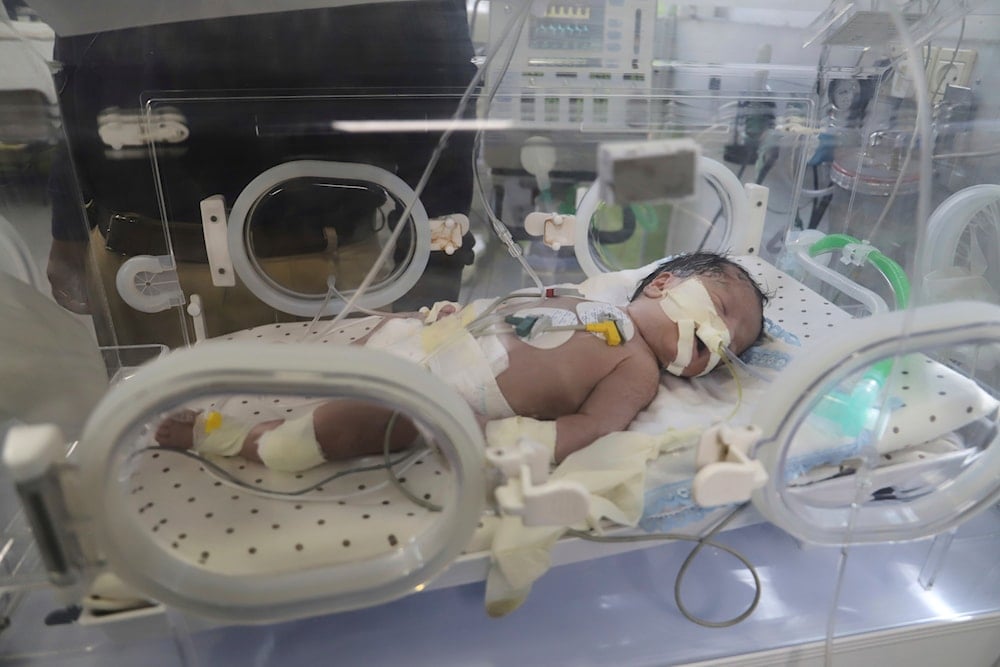Destruction of Gaza’s health system is genocide: PHRI
Physicians for Human Rights Israel says "Israel’s" systematic destruction of Gaza’s healthcare system amounts to genocide under Article II(c) of the Genocide Convention, with lasting effects beyond the battlefield.
-

Newborn Soad Qeshtah was seen in an incubator in Nasser Hospital in Khan Younis, hours before she died on July 28, 2025. (AP Photo/Mariam Dagga)
For over 21 months, "Israel" has carried out a sustained assault on the healthcare system in the Gaza Strip, effectively dismantling its capacity to treat the population, wrote Aseel Aburass, Tirza Leibowitz, and Itamar Mann in an analytical piece for the New York Times (NYT) on Wednesday. Airstrikes have repeatedly targeted hospitals, while state policy has blocked fuel, water, and essential medical supplies from entering the territory.
More than 1,800 medical personnel have been killed or arrested. Vital services, including trauma care, oncology, obstetrics, dialysis, and vaccination programs, have been halted. Public health infrastructure has been dismantled, leading to the uncontrolled spread of disease and the complete collapse of preventive care.
The question of whether "Israel" is committing genocide in Gaza continues to generate global debate, the authors stressed, adding that critics often argue that if genocide were truly being committed, it would be more immediate or spectacular. However, Physicians for Human Rights Israel (PHRI), an organization committed to advancing the right to health for all under Israeli control, has reached a stark conclusion: the destruction of Gaza’s health system constitutes genocide, as defined in Article II(c) of the 1948 Genocide Convention.
This clause defines genocide as "deliberately inflicting on the group conditions of life calculated to bring about its physical destruction in whole or in part." According to PHRI, the report mentions, it emphasizes that genocide does not need to be rapid or carried out through mass killing alone. It can occur gradually, through calculated, systematic destruction of life-sustaining systems.
Healthcare collapse: A prolonged humanitarian catastrophe
The authors mentioned that hundreds of thousands of Palestinians in Gaza are wounded, starving, or suffering from treatable illnesses. While many will not die directly from attacks, they will die from the absence of care, no access to surgery, antibiotics, or basic pain management, a the report mentions.
Moreover, the report mentioned that the health system that would normally treat cancer patients, pregnant women, children in need of vaccines, and those with chronic diseases has simply ceased to function. It argues that even if a ceasefire were reached, the lasting destruction of medical infrastructure would continue to inflict death and suffering long into the future.
PHRI’s recent report argues that the destruction of Gaza’s health system is not incidental, but deliberate, designed to avoid triggering mechanisms of international accountability while accomplishing long-term incapacitation of the population.
The systematic denial of basic resources, fuel, clean water, and medical supplies has rendered hospitals and clinics inoperable. Corridors for evacuation have been blocked, and aid convoys obstructed or delayed. According to the report, this strategy was neither accidental nor improvised; it was methodical, reinforced despite repeated international warnings.
Long-term impact on public health and recovery
The destruction of Gaza’s healthcare infrastructure will have repercussions for years, even if medical aid is allowed to enter at scale. The collapse of routine care and the loss of an entire generation of medical professionals mean that Gaza’s population will continue to suffer from preventable and untreated illnesses well after military operations cease.
PHRI asserts that the pattern of targeting is designed to avoid global scrutiny. While weapons of mass destruction or direct massacres might trigger immediate international response, dismantling healthcare systems offers a slower but equally lethal path, one that is more difficult to prosecute and easier to deny.
Medical workers in Gaza have continued their work with extraordinary resolve, even as many pay with their lives, yet their efforts can no longer hold back the tide of destruction.
PHRI concludes that this is no longer a genocide that can be prevented; the threshold has already been crossed.

 4 Min Read
4 Min Read










